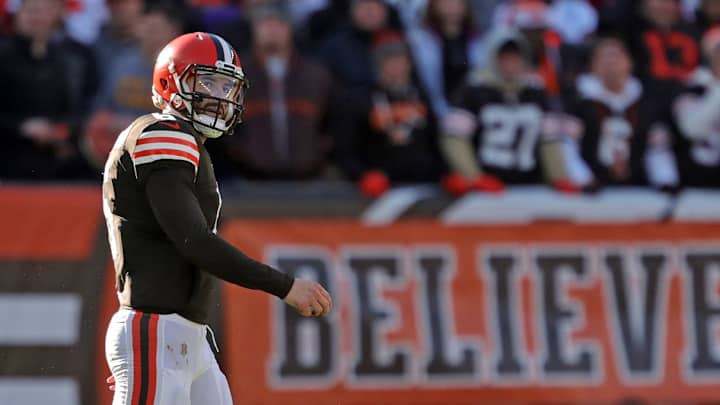Moving Games Doesn't Fix Problems Created by NFL

Despite being pronounced dead by critics on countless occasions this season, the Cleveland Browns have endured, giving themselves a chance to not only qualify for the postseason for the second year in a row, but to compete for their first division title since 1989.
Once it became clear the Browns weren't going to have a high-powered offense that could allow them to compete for the Super Bowl, onlookers were presented with a choice; be miserable for the season or get past unmet expectations and enjoy the journey this team is taking.
Those that chose the latter have watched a team face obstacles including injuries, players missing games due to COVID-19 and a teammate publicly quitting on them. In their perseverance, the team has continued to form their identity and seen growth from a young core while winning enough games to give themselves a chance for a division crown.
For the NFL to force the Browns to play a pivotal game with half their roster out due to a pandemic wouldn't simply be unfair. It would be an insult to the players, fans, and the integrity of season overall. Moving the game doesn't solve the problem, rather mitigating damage done by the league that set these events in motion.
Until this point, the NFL had taken an indifferent position on the situation under the guise of being consistent with the protocols laid out before the season. Those rules amounted to the owners deciding they were going to get every dollar out of this season regardless of the consequences. The league suffered through the bitter taste of lost revenue during the 2020 season and weren't about to go back for seconds.
As cold and heartless as that position appears, it might be defensible if they held to it. Unfortunately, actions taken this week make it untenable.
The NFLPA pushed for the league to provide daily testing for everyone in the facility. The league resisted, deciding only to test unvaccinated players every day, leaving vaccinated players to be tested intermittently.
A percentage of players around the league would kick and scream as they were forced to test daily, but the reason the NFL didn't go this route wasn't about convenience for players or personnel. It came down to cost. They didn't want to pay for the amount of testing supplies required to test the players as the NFLPA wanted.
The nature of variants, including delta and omicron weren't something the NFL could predict or account, but they didn't plan ahead nor did they adequately adapt as new information became available. Not testing vaccinated players everyday combined with how contagious new variants have proven to be enabled an outbreak to occur within the gaps of testing schedule, which has happened with the Browns, Los Angeles Rams and Washington Football Team.
The NFL did not approach updating their testing policy until a quarter of the league was in enhanced protocols and three teams had upwards of 20 players on their Reserve/COVID-19 list, which is like trying to buy flood insurance ankle deep in water.
That level of negligence impacts the league as a whole. Thursday, the NFL's mishandling of the situation made the Browns less competitive ahead of their game with the Las Vegas Raiders.
The league told teams they only had to test unvaccinated and symptomatic players. The Browns did that, then proceeded to practice early Thursday afternoon. The NFLPA pushed the league to test everyone, so the league relented, came back and made them test everyone after practice, resulting in a positive tests for multiple players, including backup quarterback Case Keenum, who was in line to start.
The one practice the Browns could get in was completely wasted at the quarterback and safety position, since both Grant Delpit and Ronnie Harrison also came up positive in the post practice testing. Had the full battery of testing been done in the first place, the Browns would have known ahead of time those players couldn't participate and could have used that time to prepare other players for the game.
That's before considering their presence may have put other players and staff at risk of contracting the virus. So any player that contracted the virus as a result of being exposed to infected teammates or staff who should not have been there in the first place is on the league. Those players also won't be available for the game, so even if delaying the game might enable players who tested positive earlier in the process, they are now losing players that could've taken part if not for the league's failure to test properly.
The best method of navigating through the pandemic is obtaining as much information as possible in an effort to gain an understanding how to best proceed. That would enable the league to better protect players, stop outbreaks before they start and return them to the field faster, protecting the integrity of the season.
Instead, a league quick to claim its commitment to player safety low-balled another consequential threat to it so 32 billionaires could get just a little more.
If the Browns lose with a COVID-19 ravaged roster, it may end their playoff viability, but would certainly cheapen the season. The Browns might otherwise fail to qualify for the postseason, but at least it would be on their own merit or lack thereof.
Delaying the game a week or even two might make the Browns whole, but would disrupt the season, eroding its credibility. It also assumes that this wouldn't then happen to any of the other 29 teams in the league.
Should the Browns defeat the Raiders, overcoming this latest challenge, it would be a testament to their resilience and further evidence of their pledge to fight to the bitter end.
What it won't do is erase how poorly the NFL handled the situation this season.
